It’s rare for filmmakers — independent or otherwise — to give us a small peak into more than just their methods and craft. Sandeep Mohan, who has even written two POV pieces for us (scroll to bottom) over the last year, finally sits down with us for an honest, freewheeling chat about why he is the way he is, and what inspires him to make the kind of cinema he does.
We assure you that this is not a promotional plug, and it is simply a happy coincidence that his new feature-length film Shreelancer is almost ready…
Being an independent filmmaker in Bombay, how important (or not) is it to live “closer” to where the action and grapevine is — like Andheri and its whereabouts. Folks like Srinivas Sunderrajan and you live far away and prefer the commute; is it a conscious decision to keep your craft undiluted? Or is it just the rent? For instance, your daily 5 AM metro rides for the sound design of Shreelancer involved a bit of traveling…
I owned a couple of palatial bungalows in Juhu before I sold them all and moved to the central suburbs (okay, I am kidding!). I cannot afford to stay anywhere. Maybe that’s the reason I travel so much, too. But honestly if I think about it, I would prefer to live where there is not too much ‘noise’. The western suburbs in Mumbai is a way too filmy for me. Everyone is a filmmaker or working on his first film. So this kind of gets a little boring. You might start believing that the whole world is like this and talks only about films. But that is not the case.
I have started loving the place where I live now. It is a middle-class area where no one cares about films the way people in “Bollywood” do in Andheri or Versova or Juhu. Staying away from the centre of action also helps me get a perspective of what I am doing with my life. I need that distance to see things for what they are and not for what people say what they are.
I do travel to that part of Mumbai only when absolutely necessary. Most of the studios are there, so for the final stages of sound or grading, I am forced to go there, which I am fine with. As for the meetings, well, I don’t think anyone wants to meet me, so I have very less meetings. Even if I have to, then I request them to come towards my part of the country called Vikhroli or Powai which is closer to the cafes where I work out of. Some of them come, some find an excuse to cancel the meetings because they don’t know where these places are!
Honestly, I have no hatred towards those living in Andheri or Versova. It is their choice to be in the centre of action and it works for them. In a strange sort of way, now whenever I go there, I feel like a tourist and try to enjoy the sights and sounds; I even taken pictures and post them online as if I am in Lakshwadeep or Andamans. Well, in any case, we all choose where we want to live. Each to his own. It somehow doesn’t suit my personality, and this seems to work for me, so why change?
You’ve been using social media in an innovative way to promote your feature-length projects even during production. And then the Great Indian Traveling Cinema initiative, and a decision to not release it commercially in cinemas. But you released your first, Love Wrinkle-Free in theatres (PVR Director’s Rare). Why the drastic change after that? Does the small-scale digital distribution strategy not affect the ambition of your work?
Facebook is a great leveller. It gives a voice to filmmakers like me to interact directly with our potential audience. And for me, I am interested to know what keeps them going. I want to know what they think, how they think, what are the issues that matter to them etc. I like to peek into their photos and see a bit of their life…it is like a movie.
As for The Great Indian Traveling Cinema initiative, it was something that I did because I was tired of meeting ‘Agents’ and ‘Experts’ who claim to love films, but in real I feel they love money more than films. They suck the energy and motivation out of you. Countless meetings, in addition to expert gyaan on why things cannot happen etc. For me, it is important to have a fine balance between money and aesthetics. So I decided to see whether I can create a small and loyal audience base for my kind of films. It is an experiment, and it still is. I am learning. I may fail, but at least I would have tried. Let’s see…
Love Wrinkle-free, my first film had a decent release through PVR Director’s Rare. I am thankful to them too for that. But I realised firsthand that you need to pump in a lot of money to get the word out about the movie, or else people don’t flock to the theatres. Despite less advertising, Love Wrinkle-free managed to get a decent number of people coming to theatres, mostly because of word of mouth, but theatres want nothing less than housefulls!
To be honest, I make all my films hoping to see them in a cinema hall. That is why I make films. But then the reality is different. What can I do? But I don’t compromise on the ambition. I tell exactly the story that I want to say, to be seen in a cinema hall in the biggest way possible. But if it is unable to reach these screens, no issues. You can catch it online. But I don’t compromise in the way I make the film. It is cinema that I am interested in.
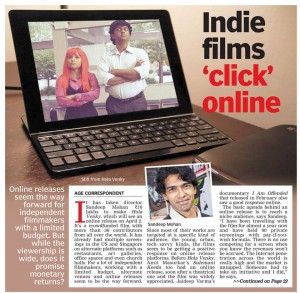
Why not find so many new production platforms who operate digitally — to help market and push your films in all directions, and see what sticks?
I wouldn’t mind doing that. But before approaching others, I should know how all this really works. And I am figuring all that out by doing it on my own, making mistakes and learning from them. Like I said earlier, a combination of limited theatrical, traveling cinema, fests and a good online release is what I would love to do…
There are a whole lot of Indian viewers — the ones who’re used to visiting theatres — who think that a desi film available for pay-per-view streaming may have failed to find takers, and use the internet as a last resort. Apart from word-of-mouth, how can you change this perception?
Like I said, I don’t start off with online as my sole goal. Online is a huge part of my plans, but I want my films to have a limited theatrical release too. It adds to the “value” of the film in people’s perception.
How do you make revenue back for your producers or yourself online?
For Hola Venky, we had a limited theatrical release in San Jose and San Francisco where we had a 4 weekend release. We sold tickets in good numbers. Some money did come back from that. I am glad. Also with platforms like Netflix and Amazon and others coming in and willing to offer good money for good content, money will come in and we will be in a good space for sure. I believe in long term than short term returns, and somehow I am lucky to have gotten investors or donors who appreciate that and trust us on this. It is a long journey, and eventually it will all add up. This, I am confident about.
What do you do in between films to run the household, or to maybe fund your next film? Filmmakers find it hard to make a living solely from directing here, but rarely speak about what pays the bills.
There is a small fee for me in all projects, I save it. Beyond that, I live a very simple life. I don’t go to fancy restaurants, don’t shop for expensive clothes, don’t “drive” a car. At the same time, I don’t want to struggle nor romanticise the struggle. With what I have, I live a life where I travel to interesting places in buses or trains or book flights much in advance for cheaper tickets. I try to eat from the roadsides the best of food. I spend time with people who love me unconditionally. I try to infuse their life with my enthusiasm. The way I live is how I make my films. I love to have fun in life with that I have, and the good news is that you can actually do it if you want to. You don’t need too much money to make others smile. It’s an attitude, I guess.
You’ve been writing a lot about how cafes are your office lately, and all your work/thinking gets done there. You spend time traveling a lot too. What does your family think of these “solitary artist” ways?
It is not that I am travelling all throughout the year. But yes,whenever I do that, they know why I am doing it and support me. Also in any case, I reveal only a tiny part of my life through Facebook; that is not entirely me. Travelling is very important for me because that is what gives me material for my scripts.
You take that away from me and I can become a depressing guy to have in the house. So my lovely wife backs me totally. And I am ever grateful for that, and I do whatever I can do to make their life enjoyable. We manage, without too many complaints…just like millions of other humans in this world.
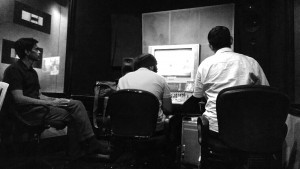
You speak about how your filmmaking ambitions are modest, and you don’t expect to be included in a bracket of greats and festival auteurs. But isn’t that self-defeating — because filmmaking itself is an act of extraordinariness? It requires a fiercely driven mindset — does this not extend to your ambitions of craft? How can one take such a risk and then aspire to not be great? I’m sure you, like many, love your work being appreciated and selected at festivals etc. Or is it just personal and therapeutic?
I make films only so that I can express what I cannot otherwise. There are a lot of things that words or images or voices or music by itself cannot capture. A combination of all these sometimes brings out what I want to say better. Even in real life, I find it very difficult to express myself completely. Most of the times, I don’t understand myself too, so I explore themes and ideas that I am confused about through the medium.
I don’t think film making is an act of extra ordinariness. At least for me. Yes, you need to be focused and disciplined and need to have an imagination and all that, but it is the case with many people who are not filmmakers. I feel this, but please feel free to disagree. Just my opinion
Greatness is a very subjective thing. I feel the moment you feel you are ‘great’ and you start believing those who tell you that you are a ‘special’ one, some energy goes out of your system. You start to think that you cannot make any mistake. How can anyone be creative in that space? I don’t want to fall into that trap. I want to keep making mistakes…and learn. I am full of flaws, and I understand that.
I have no issues if my films get selected into film festivals. Why would I? It will be great if the film gets seen by more people. But I don’t make films with festivals in mind. I make films to express myself. And I try to tell it an way that is engaging. Some festivals don’t know where to slot my films I suppose, but I think eventually they will discover it, if they want to. Otherwise I am okay with my life as it is.
You like to tell low-cost stories about normal, everyday people in unorthodox situations — which, on its own, can make for fantastic slice-of-life cinema too. That doesn’t make the films ordinary too, right? Woody Allen has done it for decades, hits and misses, but always loyal to this theme.
Honestly, I don’t think we should brush off “ordinariness”. It is extremely difficult to be ordinary. Many are running after making a perfect film and maybe “extra-ordinariness”. Why add so much pressure on yourself? I am comfortable staying true to what I am which is ‘normal’. My films are fun and engaging and slice of life and any sensible ordinary person who can read English subtitles can engage with the film I feel.
I love Woody Allen. The energy and discipline that he has to make the films that he has made and keeps making is something that encourages me. All that I want is to stick to my convictions and keep telling stories till I die. Let’s see if I am able to do that, or if life has something else in store. Who knows?
Shreelancer sounds like a film most inspired by your own experiences, as compared to your previous two. You’ve been documenting the journey online on FB statuses etc. How do you convince like-minded people to put in some money?
I put my heart, soul and lot of sweat into my films. Maybe my dear friends like Giju John and others are able to appreciate it and hence back me. I have never asked them. I will be friends with them even if they don’t put money into my films. I respect them a lot and believe that they are wonderful human beings. Without friends, I am nothing. I value them a lot. I just want to follow my heart and hope and pray they keep backing me the way they have been.
There’s a tone of self-depreciation in many indie filmmakers here, to the point of controlled cynicism and smiley-face-emotiocon passive-aggression. Though you sound fulfilled and positive during the process. While it’s nice to be exceptionally humble, is this attitude a product of being around the block and back? Many of you seem to have taken the early hard knocks…
I am not humble, you can call me stubborn and arrogant, I prefer that. I am here only because of my hard work and discipline and with the help of a few of my close friends and family. So there, you see, I am not humble!
I am not here to change the system, nor to help anyone else make their film. Yes, if my process inspires someone else, that is great. I appreciate anyone who is listening to his or her heart. We connect. But I am here to tell my stories, express myself, and then one day, die. Yes, I respect people. It is how I was brought up. I will not misbehave with anyone. Being polite or respectful doesn’t make me humble.
Yes I have had tough experiences in life, and not just in the film industry. But nothing comes easy. My life experiences have taught me early on that it is important to have a sense of humour in life, or else you are going to get bitter very soon. In fact, I see the world as a circus and all of us as jokers. More often than not, I do get the joke that has been played on us by God. So I try to complain less these days and carry on…
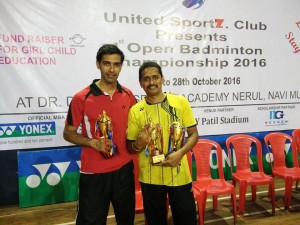
Why didn’t you take up badminton professionally?
At times I feel I love sports more than I love other things. I was more of a cricketer till 21 who played occasional badminton. Yes, as a kid I did have those sporty dreams, but who didn’t, right?
Some of my friends went on to play professionally. But it never worked out for me. Maybe I was not good enough, or maybe I did not have the backing needed at the right age. Professional sports is not easy as it looks.
Now I play the Veteran’s Badminton Tournaments, which are age-group oriented. I have played the nationals representing Maharashtra state. I win a few matches, lose much more!
For me, I am living a dream that I could never live when I was a kid. I have never ever been coached as a kid and it is something that I have picked up along the way, just like I don’t have any film school training. In fact, I am much more at ease during a badminton tournament than at a Film Festival or a Film Market. I am happy to be in the presence of ex-National and State players who have so many stories of grit and passion to tell from their younger days. I am like this small kid when with them, holding onto every bit of these stories…
Sports also teaches you that it is important to give your 100% in whatever you do, but it is okay to lose. Losing is not a bad thing, but not practising or giving your 100% is a sin. Also at the end of the game, you shake hands with your opponent and say “Well played” despite wanting to almost kill each other with your smashes during the match. I wish more people say “Well played” in real life too. The world would be much more peaceful that way.
I fight hard for what I believe in, but I play fair, maybe because of this little sporting background.
(PS: I am no expert. I am still figuring things out, just like you)
You can find a little bit more about Sandeep Mohan at:
https://about.me/sandeepthemohan
As well as his previous articles written for this website:
Marching to my own heartbeat
Me, Myself and Shreelancer



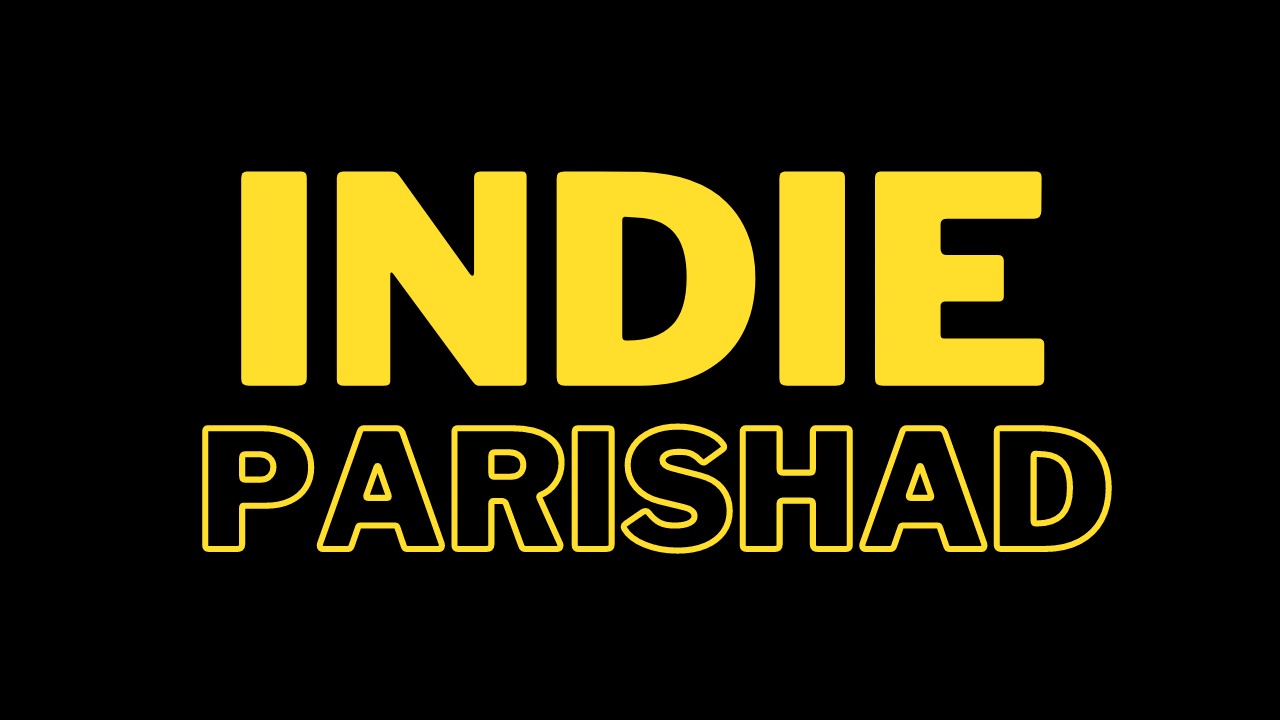
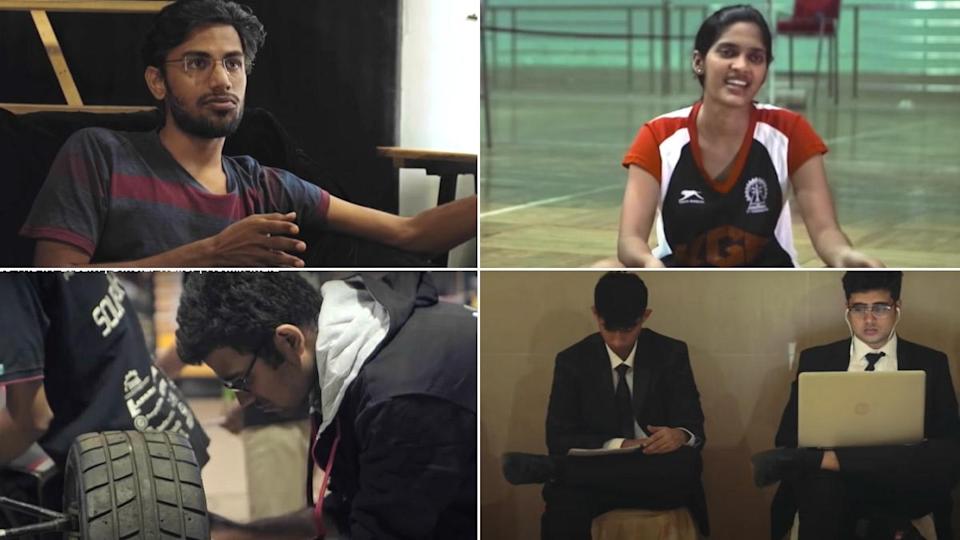
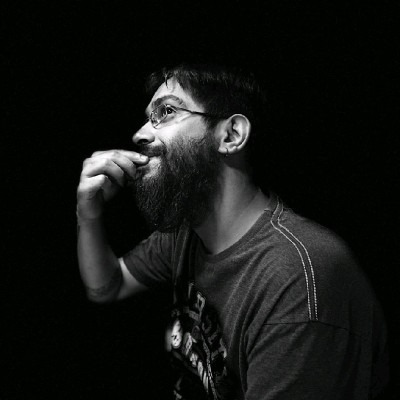



Leave A Comment
You must be logged in to post a comment.